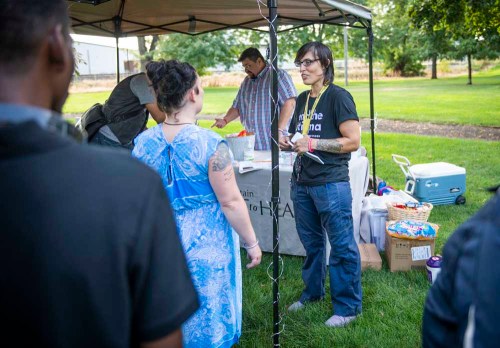Walla Walla health officials say pandemic heightened fentanyl crisis
Published 5:00 am Friday, June 23, 2023

- Registered nurse Sarah Murray talks about an overdose recovery nasal spray at the Blue Mountain Heart to Heart booth at Washington Park in August 2022.
WALLA WALLA — Walla Walla health care workers say the rise of fentanyl has reached a point of crisis and its growing use is a lingering impact of the pandemic.
Fentanyl is a synthetic opioid prescribed for severe pain, although it is also illicitly manufactured and used to lace drugs in both liquid and powder form.
Everett Maroon, director of Blue Mountain Heart to Heart, a Walla Walla-based organization that offers substance abuse treatment, recently completed a study with University of Washington researchers about fentanyl in Washington state. During the study, 30 fentanyl users were interviewed across the state.
“I heard directly from participants in Spokane what I’ve heard from people who utilize my programs here in Walla Walla,” Maroon said. “It’s like heroin disappeared almost overnight. I asked a couple people, ‘When would you peg that shift?’ and they said March of 2020.”
He said as the world was shutting down, people couldn’t find heroin and quickly shifted to fentanyl. Maroon said one of the more alarming aspects of the shift was that people stopped coming into syringe program sites for clean syringes. Fentanyl is more commonly smoked than injected.
“That made me really nervous because I know fentanyl is 50 times more potent than heroin and 100 times more potent than morphine and was leading to much, much greater overdose rates around the state including here,” Maroon said. “So at the same time that they’re at much more significant risk for overdose and overdose deaths, they are not coming to the program that helps them engage in treatment and recovery and at least lets people get eyes on them to see how they’re doing.”
As a result, Blue Mountain Heart to Heart has started giving out smoking kits. Maroon said this was a risky move because nonprofits such as Blue Mountain Heart to Heart don’t have the same kind of protections in distributing smoking kits, whereas syringe distribution is exempt from the state’s paraphernalia statute and is considered an essential public health service.
“I had reached out to local law enforcement and some other partners and said, ‘Hey, we’re doing this, we know this is a bit unorthodox, but we really want to be able to keep people engaged in our services,’” Maroon said. “And it really helped us. We saw people we’ve never seen before, and we saw people who had stopped coming in return. So it did have the effect that we wanted it to have.”
Fentanyl in plain sight
While Maroon said most fentanyl users are aware of what drug they’re using, Dr. Aaron Vawter, a family medicine specialist at Providence St. Mary Medical Center, said he had come across people who were unaware they were using fentanyl.
Fentanyl can be added to drugs such as cocaine and heroin without altering the appearance of the drug. It can also be pressed into pills that look like other prescription drugs such as Xanax. Vawter said he has seen people in the Walla Walla emergency room who overdosed on fentanyl because they didn’t know they were using it.
“The risk of drug use goes up tremendously if what they’re getting on the street has more than they bargained for in it,” Vawter said. “So they can have something they’re smoking that they think is marijuana, and if there’s fentanyl in it, then they have a much higher risk of overdose.”
He said anyone buying drugs from an illicit source should be aware that it could contain fentanyl.
Vawter also said the fentanyl crisis had highlighted the lack of mental health services available in the Walla Walla area. He said many drug users have mental health issues as well, but not nearly enough resources.
“Unfortunately, mental health services are still really challenging in our area to get patients into,” Vawter said. “We’ve got a long wait list for a lot of counselors and clinics because it’s a high volume and high demand area with not enough practitioners now.”
Opioid settlement funds
The city and county of Walla Walla recently began receiving payments from a 2022 opioid settlement that will be used to address issues brought on by the opioid crisis.
The $518 million settlement between the nation’s three largest prescription opioid distributors and the state of Washington resulted in a combined $1.8 million that will come to the city and county over the next 17 years.
It has not yet been decided exactly how the money will be spent. Walla Walla City Council recently approved the appointment of Greater Columbia Behavioral Health as the region’s Opioid Abatement Council. Forming an OAC is one of the requirements to receive settlement funds.
“The OAC will review annual reports once jurisdictions begin spending their settlement funds, ‘clearing house’ for each jurisdiction’s spending plan and act as a mediator if a jurisdiction does not spend the funds per the settlement agreement’s terms,” said City Manager Elizabeth Chamberlain.
The city has received three payments so far. Chamberlain said the city would receive $25,000 annually, which will be set aside into a separate, standalone fund.
“We are in the planning stages of how to utilize the settlement funds efficiently and effectively,” she said. “This planning stage includes having conversations with Walla Walla County about combining funds to serve the broader community.”




